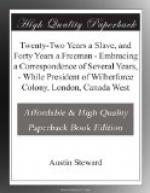One evening I was walking around the encampment in company with a Mr. James Morrison, a clerk in the land office, looking at the soldiers, until we came near a sentinel on duty. He kept his gun to his shoulder until we came near enough, and then he attempted to run me through with his bayonet. Young Morrison sprang forward, and seizing the musket, told me to run; I did so, which probably saved my life.
CHAPTER XI.
THOUGHTS ON FREEDOM.
After living sometime in Bath, and having the privilege of more enlightened society, I began to think that it was possible for me to become a free man in some way besides going into the army or running away, as I had often thought of doing. I had listened to the conversation of others, and determined to ask legal counsel on the subject the first opportunity I could find. Very soon after, as I was drawing wood, I met on the river bridge, Mr. D. Cruger, the eminent lawyer before mentioned, and I asked him to tell me if I was not free, by the laws of New York. He started, and looked around him as if afraid to answer my question, but after a while told me I was not free. I passed on, but the answer to my question by no means satisfied me, especially when I remembered the hesitancy with which it was given.
I sought another opportunity to speak with Mr. Cruger, and at last found him in his office alone; then he conversed freely on the subject of Slavery, telling me that Capt. Helm could not hold me as a slave in that State, if I chose to leave him, and then directed me to D. Comstock and J. Moore; the first being at the head of a manumission society, and the last named gentleman one of its directors.
Our condition, as I have said before, was greatly improved; and yet the more we knew of freedom the more we desired it, and the less willing were we to remain in bondage. The slaves that Capt. Helm had sold or hired out, were continually leaving him and the country, for a place of freedom; and I determined to become my own possessor.
There is no one, I care not how favorable his condition, who desires to be a slave, to labor for nothing all his life for the benefit of others. I have often heard fugitive slaves say, that it was not so much the cruel beatings and floggings that they received which induced them to leave the South, as the idea of dragging out a whole life of unrequited toil to enrich their masters.
Everywhere that Slavery exists, it is nothing but slavery. I found it just as hard to be beaten over the head with a piece of iron in New York as it was in Virginia. Whips and chains are everywhere necessary to degrade and brutalize the slave, in order to reduce him to that abject and humble state which Slavery requires. Nor is the effect much less disastrous on the man who holds supreme control over the soul and body of his fellow beings. Such unlimited power, in almost every instance transforms the man into a tyrant; the brother into a demon.




